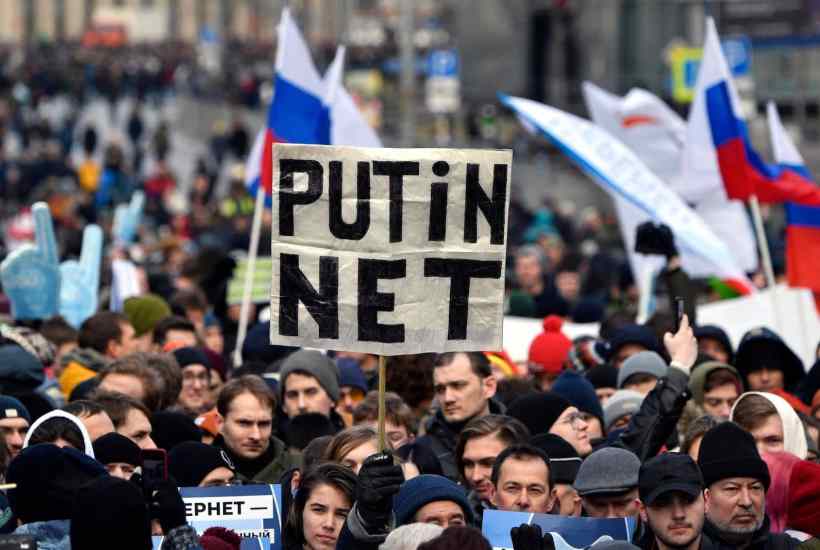One of the reasons why I judged — wrongly — that Vladimir Putin would not order an all-out invasion of Ukraine was the likelihood of a protracted war. But another was the possibility of popular protest in Russia, which could have potentially destabilising effects on the Kremlin.
After sporadic protests in the hours immediately after the invasion, all of them ending in arrests or dispersal by police — citing Covid restrictions — Thursday evening sprang a surprise. Young people came out in their hundreds with homemade placards saying ‘nyet voine’, no to war, not just in Moscow and St Petersburg, where political engagement tends to be higher, but in nearly 50 towns and cities across Russia.
Look at the size of anti-war protestors in St Petersburg, Russia. Wow pic.twitter.com/dHg9Uwt9RQ
— Ragıp Soylu (@ragipsoylu) February 24, 2022
It should go without saying that to join such protests in today’s Russia takes courage. But even if this is a one-off, and even if repressive police action thwarts any recurrence, these widespread protests give a glimpse of Russian opinion that cannot have been welcomed by the Kremlin.
For years it has seemed that Putin’s hold on power has been down to more than just blunt authoritarianism. To many Russians, he brought stability after the ructions of the Yeltsin years, raised living standards, and restored some dignity to Russia internationally after the humiliation of the Soviet collapse. Putin has traditionally also had a knack for anticipating where the shifting centre of Russian opinion is at any one time, and adjusted accordingly. That sense has become less sure in the past two or three years.
The increasing incidence of popular protest is one indicator. The last major Russian demonstrations were a decade ago when Putin decided to seek re-election to the presidency in 2012. These protests involved a preponderance of the young middle-classes and were centred in Moscow and St Petersburg.
There may be many reasons why this could now be changing — and they include the popularity and availability of social media all over Russia, which has given people the opportunity to link up with those of like mind. Social media gave protesters in Belarus two years ago an ability to organise and a nimbleness that they would not have had even a few years before. The same applies in Russia now.
Something else has changed too: the geographical spread. Alexei Navalny, the anti-corruption campaigner and opposition figure (now in prison on political charges) is a master of social media, giving him support groups all over Russia. Even before the latest crackdown, his supporters represented only a small proportion of Russia’s population, but their geographical reach was something new.
The amount of ferment generally outside Moscow and St Petersburg should not be underestimated either. Local environmental issues, including new roads through forests or the siting of waste incinerators, are a particular trigger for protests. But local personnel changes, too. Eighteen months ago there were huge street protests in Khabarovsk in the very far east of Russia, weekend after weekend, in support of the local governor who had been spirited off to Moscow to face criminal charges. They eventually petered out, but not before spreading to other regional cities, including Vladivostok, where they took on a distinctly anti-Kremlin tinge.
Perhaps in recognition of a potentially volatile public mood, the Russian government’s handling of Covid also seemed designed to fend off criticism of Moscow. Policies were largely set regionally, and Putin himself made known that there would be no compulsory vaccination — even though the infrastructure in Russia would make that simpler than in some countries. Compulsion, the thinking seemed to be, could precipitate protests.
So the apparent failure to pre-empt this week’s protests over Ukraine seems strange. Still stranger is the lack of serious preparation of public opinion for the invasion. Putin’s ratings are reported to have soared after his announcement of the invasion, but things could change rapidly if Russian operations do not go smoothly. There is a longstanding aversion to war in Russia that Putin has in the past known he must reckon with.
Born into a family that lived through the Leningrad siege and with contemporaries sent to fight in Afghanistan, Putin knows both the cost and the political risks of war. The Afghan intervention turned into a humiliation for the Soviet Union and arguably contributed to its collapse. Putin was careful to ensure that military involvement in Syria was limited largely to air support. Meanwhile, the last eight years of Russian involvement in eastern Ukraine has been murky, to say the least. Putin’s Russia has also eschewed engagement in a succession of emergencies in the former Soviet Central Asian countries — with the exception of the latest unrest in Kazakhstan, where Russia led a contingent earlier this year that departed after two weeks.
A war in Ukraine, which many Russians know first hand having family and friends there, also contains special dangers that mean any existing public support could soon turn sour. Russians, especially younger citizens, no longer live in isolation from the outside world. Many have travelled and know people who live or study abroad and they resent their country becoming a byword for aggression and war-mongering.
For all these reasons, public support for the war in Russia cannot be guaranteed. And even if open protest is stifled, those who took to the streets this week, and those who watched them on their phones, will remember. Political change in Russia may not be right around the corner, but the invasion of neighbouring Ukraine could have edged it that little bit closer.
Got something to add? Join the discussion and comment below.
Get 10 issues for just $10
Subscribe to The Spectator Australia today for the next 10 magazine issues, plus full online access, for just $10.



















Comments
Don't miss out
Join the conversation with other Spectator Australia readers. Subscribe to leave a comment.
SUBSCRIBEAlready a subscriber? Log in